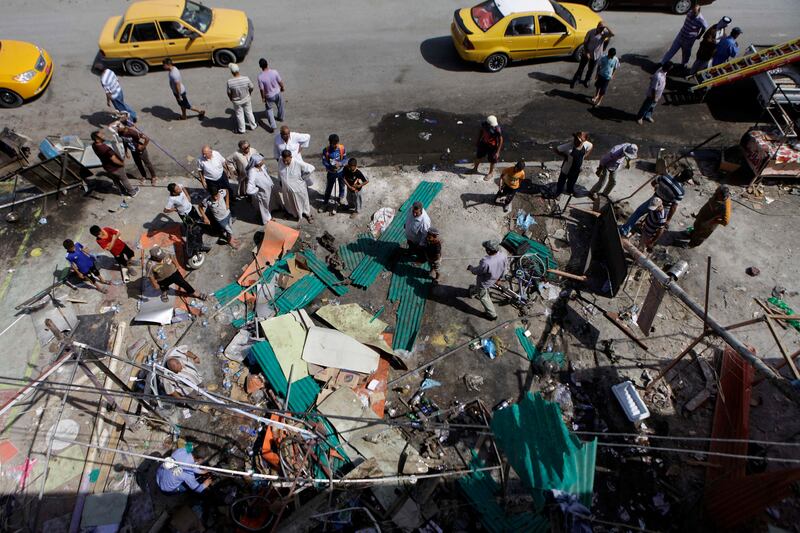KUWAIT CITY // When a bomb blast in the heart of Damascus killed President Bashar Al Assad's brother-in-law and three other top officials last week, it was not only Syria's political establishment that felt the political shock waves.
They also resounded in neighbouring Iraq, where the Shiite-led government has grown increasingly nervous that it is the target of the same sort of Sunni extremists who are among those fighting to unseat Mr Al Assad's government.
Their worries seemed to be borne out on Monday, when a wave of attacks carried out by Al Qaeda's local affiliate killed 115 people and wounded at least 300 others.
With the deadliest day of violence to hit the country in two years, the spillover of turmoil from its neighbour has thrust Baghdad once again into the heart of the region's geopolitical jigsaw puzzle.
An insecure Iraq that feels its interests threatened makes Gulf capitals nervous.
"Iraq is the first Shiite-majority Arab state" in the region, says Michael Knights, an Iraq expert at the Washington Institute for Near East Policy. "The Gulf states have ideological problems with the Iraqi government. They have strategic problems with the Iraqi government."
Ali Al Dabbagh, an Iraqi government spokesman, acknowledges that ties with the Gulf Cooperation Council (GCC) and its six-member nations need improvement.
"Relations are not to the level which we want," he says. "There are difficulties and hesitation from the GCC."
The latest source of friction is, of course, Syria, where the fighting has taken on an increasingly sectarian tone, with the fighters from Syria's majority Sunni population pitted against the Shiite-linked Alawite sect that dominates the regime.
The government of the Iraqi prime minister, Nouri Al Maliki, has reportedly stepped up its intelligence gathering with the Assad regime in recent weeks, as both governments insist it is fighting Sunni extremists, including Al Qaeda.
Izzat Al Shahbandar, a close aide to the premier, was quoted in news reports this week as saying Damascus and Baghdad had evidence that Sunni militants were travelling back and forth across the Iraqi-Syrian border.
Meanwhile, Saudi Arabia and Qatar are said to be providing funding to the rebels bidding to oust Mr Al Assad - insurgents who have at times reportedly fought alongside Al Qaeda-associated forces in Syria. The GCC is also on record as saying Mr Al Assad ought to step down.
Despite the appearance of regional governments taking up sides in Syria, Mr Al Dabbagh, the Iraqi spokesman, says his government wants to be "neutral" in regional conflicts and cannot be part of any alliance.
The civil war in Syria and fresh violence in Iraq occur at an inopportune time, just as Mr Al Maliki's administration has been keen to show that the country has turned a corner after nearly a decade of upheaval and horrific bloodshed and to renew its traditional status as an economic and political power.
Still, Baghdad's relationship with Iran remains a source of tension with its GCC neighbours.
Mr Al Maliki has visited Tehran, most recently in April, and opened negotiations on trade and other commercial agreements. Also, there are many officials in his government who lived in exile in Iran during the rule of Saddam Hussein and received aid from Tehran.
The Bahraini government has accused Muqtada Al Sadr and other Iraqi Shiite clerics of supporting Al Wefaq, the kingdom's largest, predominantly Shiite, opposition party. In protest, Manama refused to attend the Arab League summit in Baghdad in March and cancelled flights between Iraq and Iran by Gulf Air, the national airline.
It is Iraq's failure to condemn the most egregious excesses of the crackdown by Mr Al Assad's security forces during the 17-month uprising, though, that has most reinforced the impression in Gulf capitals that Iraq is too beholden to Syria's ally in Tehran.
Mr Al Dabbagh disputes the perception.
"We support the Syrian people to get their democratic system away from one party, a president-for-life, one ruling party - such dictatorship should end," he says.
Shafeeq Ghabra, a political scientist and former president of American University in Kuwait, argues that it will take some time for Baghdad's Gulf neighbours to absorb the changes that have occurred since Saddam Hussein's fall.
"The Gulf is trying to reckon with the changes in the region … Iraq is now Shia led, and Sunnis have lost their status and position."
The fear that Iraq could spoil the reordering of the regional balance of power that took place when Baghdad was consumed by post-2003 tumult may explain at least some of friction between Baghdad and the GCC, a western diplomat in Kuwait City suggests.
Worries about Iran lead some in the Gulf to claim that Iraq is a puppet of Iran, the diplomat says. "This is not true, but it's a useful argument if you don't really want to engage with Iraq."
One GCC country that has welcomed back Iraq to the regional stage is Kuwait.
Baghdad has agreed to speed along reparations payments for the 1990-1991 Gulf War and this month, Kuwait announced that it would halt construction of a controversial port that would likely have taken business from Iraqi to Kuwaiti shores.
"The relation with Iraq has been calmer, there has been business going on," says Ghabra. "But a lot of effort has to be done to create more trust. Iraq has to put its house in order."
[ foreign,desk@thenational.ae ]






